Journal of Thrombosis and Thrombolysis ( IF 4 ) Pub Date : 2024-04-16 , DOI: 10.1007/s11239-024-02972-5 Ahmed E. Ali , Richard C. Becker

|
Arterial and venous thromboembolism is a major medical concern that requires therapeutic anticoagulation in various medical fields to prevent its drastic consequences. Despite significant advances in anticoagulant therapy, thrombosis remains a leading cause of morbidity and mortality worldwide. Traditional anticoagulants like heparin and vitamin K antagonists (VKAs) have shown efficacy in preventing and treating thrombosis but come with an inherent risk of bleeding due to their non-specific inhibition of multiple coagulation factors. Subsequent direct oral anticoagulants (DOACs), targeting specific factors such as Xa or thrombin, demonstrated improved safety profiles compared to VKAs, yet bleeding remains a concern. Accordingly, research is focused on developing anticoagulants with improved safety profiles. A safer class of anticoagulants would have broad appeal. The intrinsic pathway of coagulation, involving factor XI (FXI), has attracted attention as a potential target for safer anticoagulants. Preclinical studies and epidemiological data indicate that FXI deficiency or inhibition protects against thrombosis with minimal bleeding. Current research involves evaluating various FXI-directed strategies, and phase 2 studies have shown promising results in orthopedic surgery, atrial fibrillation, end-stage renal disease (ESRD), myocardial infarction, and ischemic stroke. Several agents, such as antisense oligonucleotides, monoclonal antibodies, small synthetic molecules, natural peptides, and aptamers, have been developed to inhibit FXI at different stages, offering potentially safer alternatives to traditional anticoagulants. However, the optimal balance between preventing thrombosis and the risk of bleeding associated with FXI inhibitors requires validation through extensive phase 3 clinical trials using definite clinical endpoints. Several of such trials are currently underway or planned to define the role of FXI inhibitors in clinical practice and determine the most suitable FXI inhibitor for each specific indication. The current review highlights the rationale behind developing FXI inhibitors, presenting the most advanced agents in development, summarizing completed clinical trials, and discussing ongoing research efforts.
中文翻译:

因子 XI:结构、功能和治疗抑制
动脉和静脉血栓栓塞是一个主要的医学问题,需要在各个医学领域进行抗凝治疗以防止其严重后果。尽管抗凝治疗取得了重大进展,血栓形成仍然是全世界发病和死亡的主要原因。肝素和维生素 K 拮抗剂 (VKA) 等传统抗凝剂已显示出预防和治疗血栓形成的功效,但由于其对多种凝血因子的非特异性抑制,存在固有的出血风险。随后针对 Xa 或凝血酶等特定因子的直接口服抗凝剂 (DOAC) 与 VKA 相比,安全性得到改善,但出血仍然是一个问题。因此,研究重点是开发安全性更高的抗凝血剂。一类更安全的抗凝剂将具有广泛的吸引力。涉及凝血因子 XI (FXI) 的内在凝血途径作为更安全的抗凝剂的潜在靶点而引起了人们的关注。临床前研究和流行病学数据表明,FXI 缺乏或抑制可以在出血最少的情况下防止血栓形成。目前的研究涉及评估各种 FXI 导向策略,2 期研究已在骨科手术、心房颤动、终末期肾病 (ESRD)、心肌梗塞和缺血性中风方面显示出有希望的结果。已经开发出多种药物,例如反义寡核苷酸、单克隆抗体、合成小分子、天然肽和适体,以在不同阶段抑制 FXI,为传统抗凝剂提供潜在的更安全的替代品。然而,预防血栓形成和与 FXI 抑制剂相关的出血风险之间的最佳平衡需要通过使用明确的临床终点的广泛 3 期临床试验进行验证。目前正在进行或计划进行多项此类试验,以明确 FXI 抑制剂在临床实践中的作用,并确定针对每种特定适应症最合适的 FXI 抑制剂。当前的综述强调了开发 FXI 抑制剂背后的基本原理,介绍了正在开发的最先进的药物,总结了已完成的临床试验,并讨论了正在进行的研究工作。



























 京公网安备 11010802027423号
京公网安备 11010802027423号